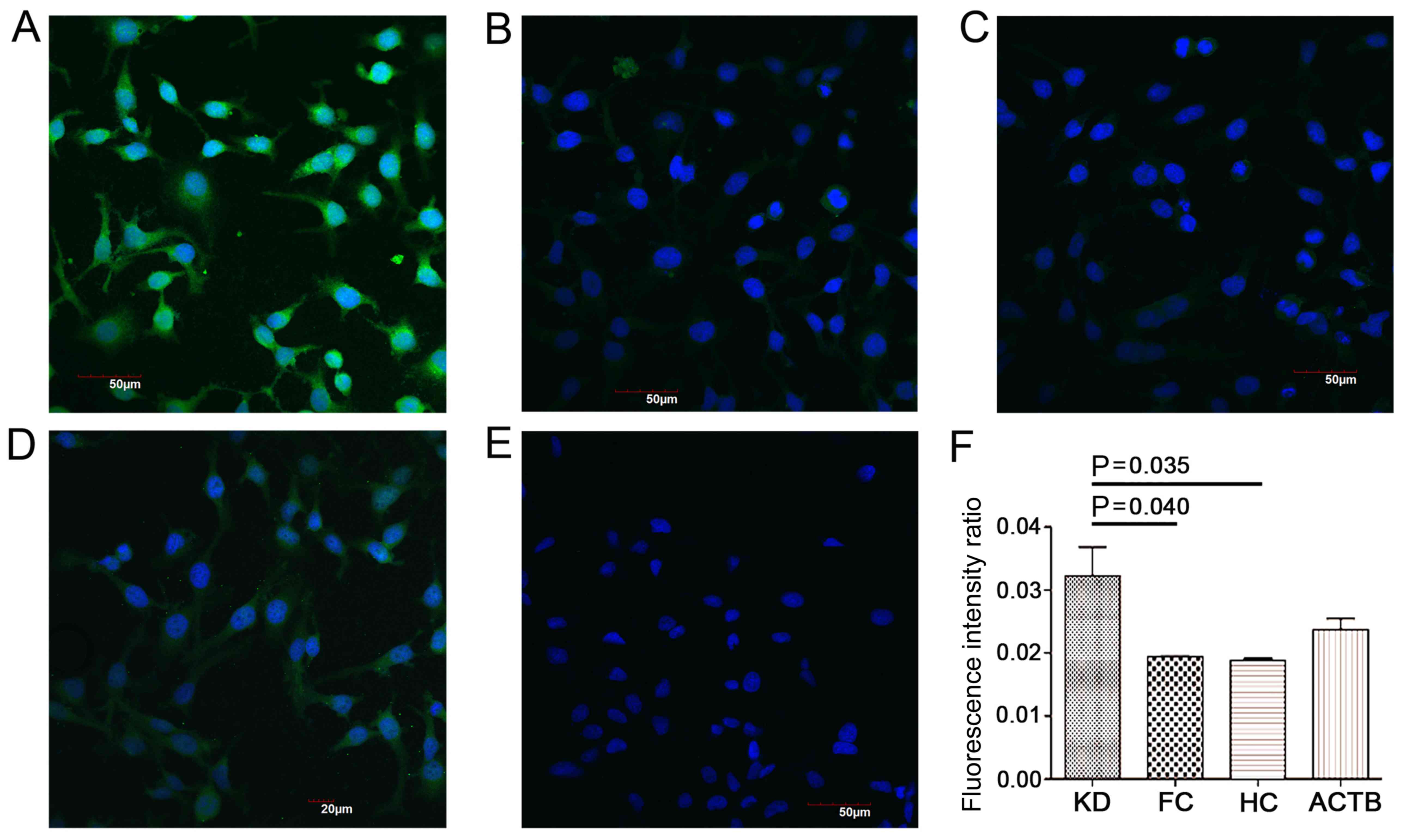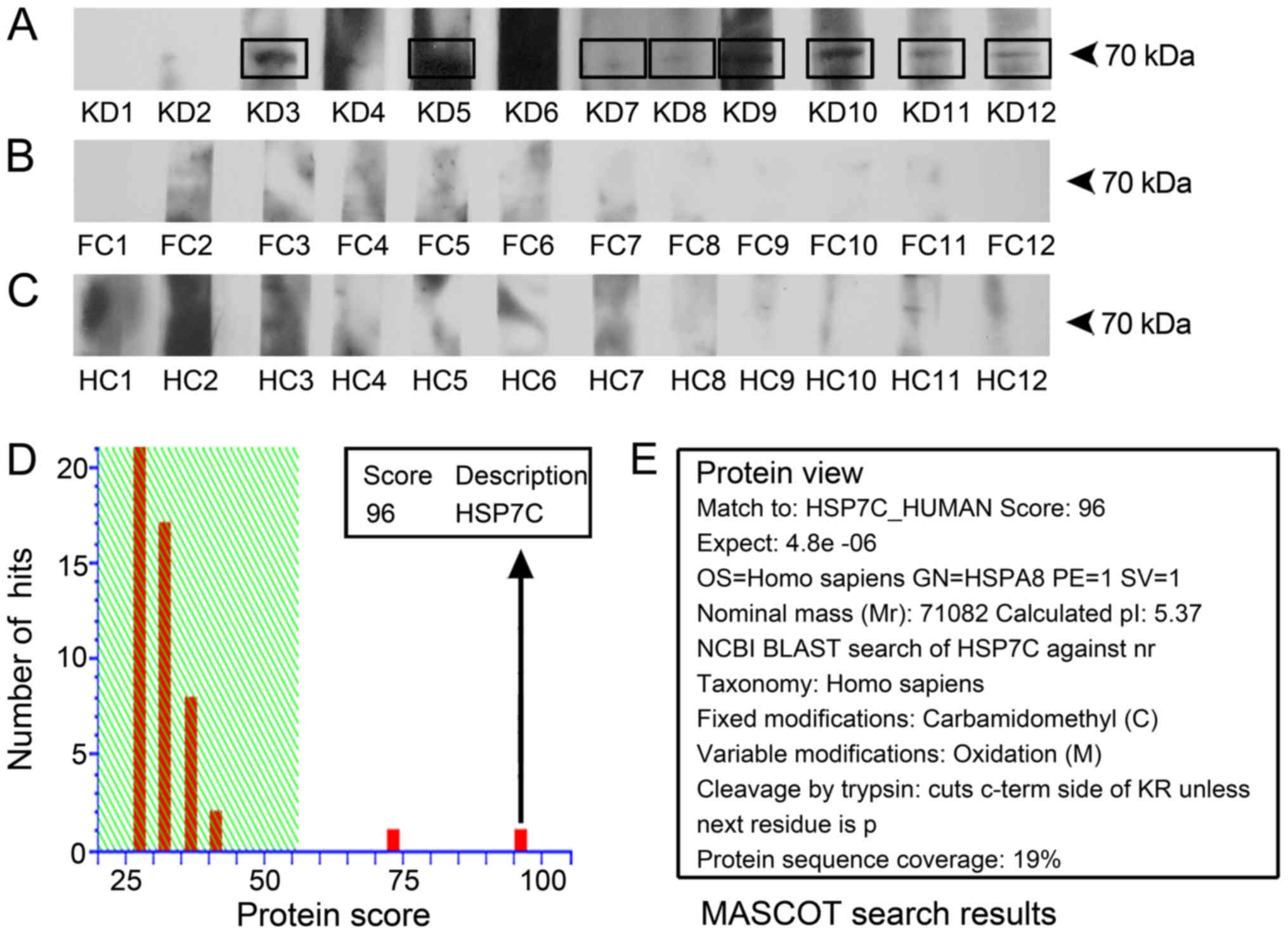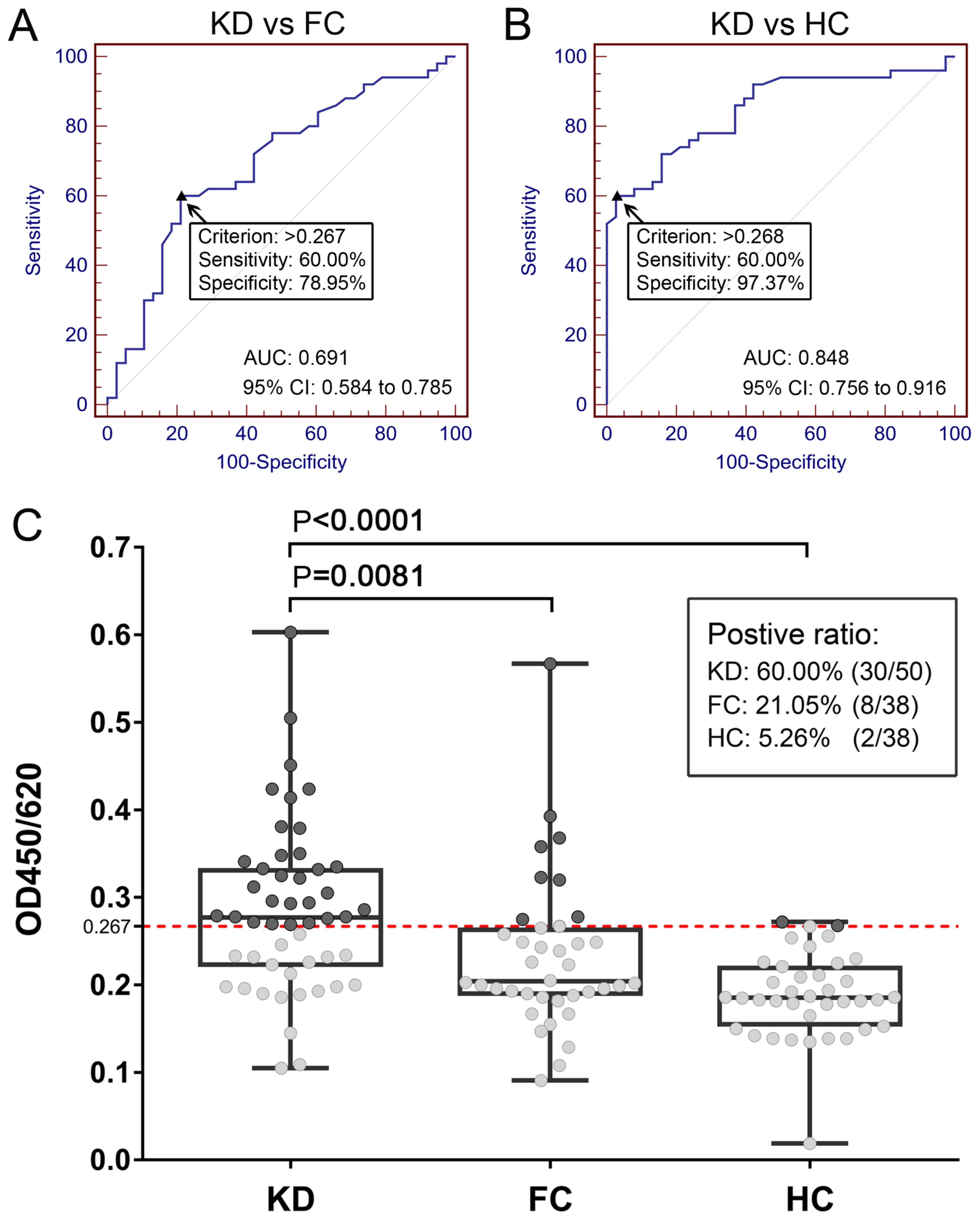|
1
|
Kawasaki T: Acute febrile mucocutaneous
syndrome with lymphoid involvement with specific desquamation of
the fingers and toes in children. Arerugi. 16:178–222. 1967.(In
Japanese). PubMed/NCBI
|
|
2
|
Dajani AS, Taubert KA, Gerber MA, Shulman
ST, Ferrieri P, Freed M, Takahashi M, Bierman FZ, Karchmer AW,
Wilson W, et al: Diagnosis and therapy of Kawasaki disease in
children. Circulation. 87:1776–1780. 1993. View Article : Google Scholar : PubMed/NCBI
|
|
3
|
Kato H, Sugimura T, Akagi T, Sato N,
Hashino K, Maeno Y, Kazue T, Eto G and Yamakawa R: Long-term
consequences of Kawasaki disease. A 10- to 21-year follow-up study
of 594 patients. Circulation. 94:1379–1385. 1996. View Article : Google Scholar : PubMed/NCBI
|
|
4
|
Benseler SM, McCrindle BW, Silverman ED,
Tyrrell PN, Wong J and Yeung RS: Infections and Kawasaki disease:
Implications for coronary artery outcome. Pediatrics.
116:e760–e766. 2005. View Article : Google Scholar : PubMed/NCBI
|
|
5
|
Takahashi K, Oharaseki T and Yokouchi Y:
Pathogenesis of Kawasaki disease. Clin Exp Immunol. 164 (Suppl
1):S20–S22. 2011. View Article : Google Scholar
|
|
6
|
Newburger JW, Takahashi M, Gerber MA,
Gewitz MH, Tani LY, Burns JC, Shulman ST, Bolger AF, Ferrieri P,
Baltimore RS, et al: Diagnosis, treatment, and long-term management
of Kawasaki disease: A statement for health professionals from the
Committee on Rheumatic Fever, Endocarditis, and Kawasaki Disease,
council on cardiovascular disease in the Young, American Heart
Association. Pediatrics. 114:1708–1733. 2004. View Article : Google Scholar : PubMed/NCBI
|
|
7
|
Onouchi Y: Genetics of Kawasaki disease:
What we know and don't know. Circ J. 76:1581–1586. 2012. View Article : Google Scholar : PubMed/NCBI
|
|
8
|
Yoshioka T, Matsutani T, Iwagami S,
Toyosaki-Maeda T, Yutsudo T, Tsuruta Y, Suzuki H, Uemura S,
Takeuchi T, Koike M and Suzuki R: Polyclonal expansion of TCRBV2-
and TCRBV6-bearing T cells in patients with Kawasaki disease.
Immunology. 96:465–472. 1999. View Article : Google Scholar : PubMed/NCBI
|
|
9
|
Rowley AH, Eckerley CA, Jäck HM, Shulman
ST and Baker SC: IgA plasma cells in vascular tissue of patients
with Kawasaki syndrome. J Immunol. 159:5946–5955. 1997.PubMed/NCBI
|
|
10
|
Cui J, Zhou Y, Hu H, Zhao L, Du Z and Du
H: PGK1 as an immune target in Kawasaki disease. Clin Exp Immunol.
194:371–379. 2018. View Article : Google Scholar : PubMed/NCBI
|
|
11
|
Guidelines for diagnosis and management of
cardiovascular sequelae in Kawasaki disease. 2005.
|
|
12
|
Sun S, Ma H, Han G, Wu R, Zou H and Liu Y:
Efficient enrichment and identification of phosphopeptides by
cerium oxide using on-plate matrix-assisted laser
desorption/ionization time-of-flight mass spectrometric analysis.
Rapid Commun Mass Spectrom. 25:1862–1868. 2011. View Article : Google Scholar : PubMed/NCBI
|
|
13
|
Rucker G and Schumacher M: Summary ROC
curve based on a weighted Youden index for selecting an optimal
cutpoint in meta-analysis of diagnostic accuracy. Stat Med.
29:3069–3078. 2010. View
Article : Google Scholar : PubMed/NCBI
|
|
14
|
Ruan Y, Ye B and Zhao X: Clinical
characteristics of Kawasaki syndrome and the risk factors for
coronary artery lesions in China. Pediatr Infect Dis J.
32:e397–e402. 2013. View Article : Google Scholar : PubMed/NCBI
|
|
15
|
Liu R, Gao F, Huo J and Yi Q: Study on the
relationship between mean platelet volume and platelet distribution
width with coronary artery lesion in children with Kawasaki
disease. Platelets. 23:11–16. 2012. View Article : Google Scholar : PubMed/NCBI
|
|
16
|
Iemura M, Ishii M, Sugimura T, Akagi T and
Kato H: Long term consequences of regressed coronary aneurysms
after Kawasaki disease: Vascular wall morphology and function.
Heart. 83:307–311. 2000. View Article : Google Scholar : PubMed/NCBI
|
|
17
|
Newburger JW, Takahashi M and Burns JC:
Kawasaki disease. J Am Coll Cardiol. 67:1738–1749. 2016. View Article : Google Scholar : PubMed/NCBI
|
|
18
|
Meissner HC and Leung DY: Superantigens,
conventional antigens and the etiology of Kawasaki syndrome.
Pediatr Infect Dis J. 19:91–94. 2000. View Article : Google Scholar : PubMed/NCBI
|
|
19
|
Fujieda M, Karasawa R, Takasugi H,
Yamamoto M, Kataoka K, Yudoh K, Kato T, Ozaki S and Wakiguchi H: A
novel anti-peroxiredoxin autoantibody in patients with Kawasaki
disease. Microbiol Immunol. 56:56–61. 2012. View Article : Google Scholar : PubMed/NCBI
|
|
20
|
Matsunaga A, Harita Y, Shibagaki Y,
Shimizu N, Shibuya K, Ono H, Kato H, Sekine T, Sakamoto N, Igarashi
T and Hattori S: Identification of 4-Trimethylaminobutyraldehyde
dehydrogenase (TMABA-DH) as a candidate serum autoantibody target
for Kawasaki disease. PLoS One. 10:e01281892015. View Article : Google Scholar : PubMed/NCBI
|
|
21
|
Yamamoto YH, Kimura T, Momohara S,
Takeuchi M, Tani T, Kimata Y, Kadokura H and Kohno K: A novel ER
J-protein DNAJB12 accelerates ER-associated degradation of membrane
proteins including CFTR. Cell Struct Funct. 35:107–116. 2010.
View Article : Google Scholar : PubMed/NCBI
|
|
22
|
Sopha P, Kadokura H, Yamamoto YH, Takeuchi
M, Saito M, Tsuru A and Kohno K: A novel mammalian ER-located
J-protein, DNAJB14, can accelerate ERAD of misfolded membrane
proteins. Cell Struct Funct. 37:177–187. 2012. View Article : Google Scholar : PubMed/NCBI
|
|
23
|
Kim CP, Hantouche C, Wong M, Matthes E,
Robert R, Hanrahan JW, Shrier A and Young JC: Hsp70 and DNAJA2
limit CFTR levels through degradation. PLoS One.
14:e2209842019.
|
|
24
|
Li K, Jiang Q, Bai X, Yang YF, Ruan MY and
Cai SQ: Tetrameric assembly of K+ channels requires
ER-located chaperone proteins. Mol Cell. 65:52–65. 2017. View Article : Google Scholar : PubMed/NCBI
|
|
25
|
Martin CA, Carsons SE, Kowalewski R,
Bernstein D, Valentino M and Santiago-Schwarz F: Aberrant
extracellular and dendritic cell (DC) surface expression of heat
shock protein (hsp)70 in the rheumatoid joint: Possible mechanisms
of hsp/DC-mediated cross-priming. J Immunol. 171:5736–5742. 2003.
View Article : Google Scholar : PubMed/NCBI
|
|
26
|
Lenzi C, Palazzuoli A, Giordano N,
Alegente G, Gonnelli C, Campagna MS, Santucci A, Sozzi M,
Papakostas P, Rollo F, et al: H pylori infection and systemic
antibodies to CagA and heat shock protein 60 in patients with
coronary heart disease. World J Gastroenterol. 12:7815–7820. 2006.
View Article : Google Scholar : PubMed/NCBI
|
|
27
|
Li XS, Xu Q, Fu XY and Luo WS: Heat shock
protein 22 overexpression is associated with the progression and
prognosis in gastric cancer. J Cancer Res Clin Oncol.
140:1305–1313. 2014. View Article : Google Scholar : PubMed/NCBI
|
|
28
|
Rothenbacher D, Hoffmeister A, Bode G,
Miller M, Koenig W and Brenner H: Helicobacter pylori heat shock
protein 60 and risk of coronary heart disease: A case control study
with focus on markers of systemic inflammation and lipids.
Atherosclerosis. 156:193–199. 2001. View Article : Google Scholar : PubMed/NCBI
|
|
29
|
Li XS, Xu Q, Fu XY and Luo WS: Heat shock
protein 22 overexpression is associated with the progression and
prognosis in gastric cancer. J Cancer Res Clin Oncol.
140:1305–1313. 2014. View Article : Google Scholar : PubMed/NCBI
|
|
30
|
Sun J and Zhai S: Development of Kawasaki
disease pathogenesis. J App Clin Pediatrics. 22:10372007.
|
|
31
|
Guidelines for diagnosis and management of
cardiovascular Sequelae in Kawasaki disease (JCS 2003). J Cardiol.
43:263–283. 2004.(In Japanese). PubMed/NCBI
|
|
32
|
Zhang W, Li Q, Zhao XD, Tang XM, Wang XG,
Wang M, Wu DQ, Ou Q and Yang XQ: Clinical analysis of 942 cases of
Kawasaki disease. Zhonghua Er Ke Za Zhi. 44:324–328. 2006.(In
Chinese). PubMed/NCBI
|
|
33
|
Ueno K, Nomura Y, Hashiguchi T, Masuda K,
Morita Y, Hazeki D, Eguchi T, Maruyama I and Kawano Y: Platelet
vascular endothelial growth factor is a useful predictor for
prognosis in Kawasaki syndrome. Br J Haematol. 148:285–292. 2010.
View Article : Google Scholar : PubMed/NCBI
|

















